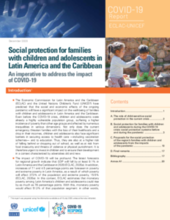The Economic Commission for Latin America and the Caribbean (ECLAC) and the United Nations Children’s Fund (UNICEF) have predicted that the social and economic effects of the ongoing pandemic will have a significant impact on the well-being of families with children and adolescents in Latin America and the Caribbean.
Even before the COVID-19 crisis, children and adolescents were already a highly vulnerable population group, suffering a higher incidence of poverty than other age groups and affected by numerous inequalities in various dimensions. Not only does the current emergency threaten families with the loss of their livelihoods and a drop in their incomes, children and adolescents also face significant barriers in securing access to health care —including vaccination schemes— and to education. Thus, they are also at a higher risk of falling behind or dropping out of school, as well as at risk from food insecurity and threats of violence or physical punishment. It is therefore urgent to invest in children and to ensure their development in a context characterized by adversities old and new.
This report showcases the centrality and urgency of social protection for families with children and adolescents in the COVID-19 context. The first section reviews the main arguments for the importance of child-sensitive social protection mechanisms in the context of the current crisis. The second section addresses the social protection gaps reported by households with children and adolescents prior to the crisis and analyses the social protection responses that the countries have adopted. The third section introduces the alternatives of an emergency basic income and universal cash grants for children as short-, medium- and long-term policies for the region. It also reviews the guidelines that should guide social protection policies in the medium and long terms in order to ensure progress towards universal, solidarity-based and child-sensitive social protection systems, which would serve to strengthen welfare states in the region and prevent another lost decade (ECLAC, 2020d). The report concludes with a series of final reflections on emerging and future challenges.

